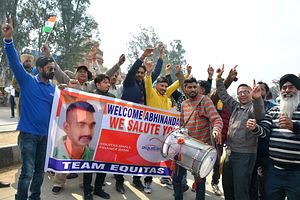Pakistani officials brought a captured Indian pilot to a border crossing with India for handover on Friday, a “gesture of peace” promised by Pakistani Prime Minister Imran Khan amid a dramatic escalation with the country’s archrival over the disputed region of Kashmir.
The pilot, identified as Wing Commander Abhinandan Varthaman, was taken in a convoy that set out from the eastern Pakistani city of Lahore to the border crossing at Wagah earlier in the day, escorted by military vehicles with soldiers, their weapons drawn.
The Pakistani military has said his plane was downed on the Pakistani-held side of Kashmir on Wednesday.
On the Indian side of the border, turbaned Indian policemen were lined up along the road as a group of cheering Indian residents from the area waved India’s national flag and held up a huge garland of flowers to welcome the pilot back.
The expected handover comes against the backdrop of blistering cross-border attacks across the disputed Himalayan region of Kashmir that continued for a fourth straight day, even as the two nuclear-armed neighbors sought to defuse their most serious confrontation in two decades.
Tens of thousands of Indian and Pakistani soldiers face off along the Kashmir boundary known as the Line of Control, in one of the world’s most volatile regions.
Tensions have been running high since Indian aircraft crossed into Pakistan on Tuesday carrying out what India called a pre-emptive strike against militants blamed for a February 14 suicide bombing in Indian-controlled Kashmir that killed 40 Indian troops. Pakistan retaliated, shooting down two Indian aircraft Wednesday and capturing the pilot.
Since the escalation, world leaders have scrambled to head off an all-out war on the Asian subcontinent. President Donald Trump in Hanoi on Thursday said he had been involved in seeking to de-escalate the conflict.
Khan, the Pakistani premier, told lawmakers on Thursday, “We are releasing the Indian pilot as a goodwill gesture tomorrow.”
But India made it clear that the latest escalation has changed its strategy and that going forward, it will strike, including inside Pakistan, if they get information of an attack in the planning. Indian Prime Minister Narendra Modi earlier Thursday warned “India’s enemies are conspiring to create instability in the country through terror attacks.”
Also Friday, Pakistan’s civil aviation authority partially re-opened the country’s airspace, allowing travel to four major cities, another sign tensions with archrival India were de-escalating.
The agency issued a statement saying all domestic and international flights will be allowed to and from the cities of Karachi, Islamabad, Peshawar, and Quetta. It said other airports, including the one located in the eastern city of Lahore that borders India, will remain closed until March 4.
Islamabad closed its air space on Wednesday after saying that Pakistan’s military shot down two Indian warplanes and captured the Indian pilot. The closures snarled air traffic.
Residents of the Pakistani border town of Chikhoti reported heavy shelling overnight and Friday morning. More than 200 people had fled to a military organized camp about 20 kilometers away from the border.
Police in Indian-controlled Kashmir said one man was wounded and at least two civilian homes were damaged in the cross-border shelling.
Kashmir has been divided but claimed in its entirety by both India and Pakistan since almost immediately after the two countries’ creation in 1947. They have fought three wars, two directly over the disputed region.
By Zaheer Babar for The Associated Press.

































